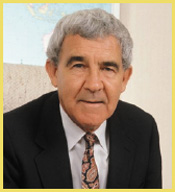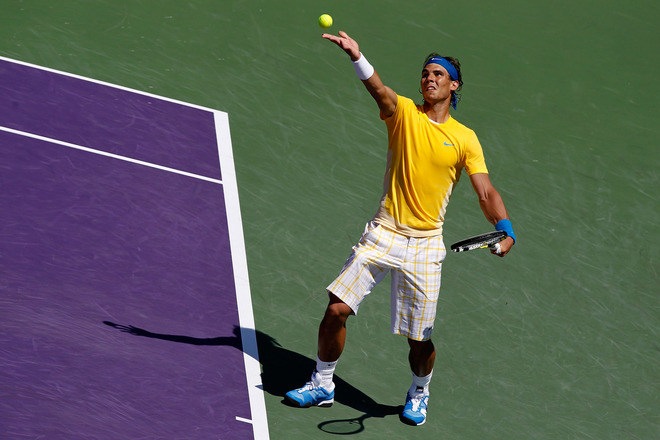The future of Davis Cup and the ITF’s iron-fisted hold over it very likely will reach a tipping point not long after the first of the year when the two men at the forefront of changing the Cup format meet with the two most powerful people in professional tennis — Adam Helfant of the ATP and Stacy Allaster of the WTA.
“If the ATP and WTA didn’t have serious interest in what we’re doing, I don’t think they’d be meeting with us,” said Butch Buchholz, the founder and former tournament chairman of the Sony Ericsson Open, which is the most important non-Slam tournament in the world.
Buchholz and former British Davis Cupper Mike Davies have been working for months on a plan to change the interminably long, 11-month-long Cup competition to more of a festival-like 10-day or two-week event which would include both men and women and be far more attractive to the best players.
Buchholz and Davies have gotten thumbs up from a legion of top-20 players, including No. 1 Rafael Nadal and No. 2 Roger Federer, and it now appears as though the ATP and WTA are also very interested in joining the conversation, which could put extreme pressure on the ITF, which owns the Cup tournament, to make changes.
But even if the January meeting produces a unified front in favor of a new format, would the ITF acquiesce?

“Mike and I were hopeful that the ITF would look at their asset and see if it needs to be changed,” said Buchholz. “They decided they didn’t need change. Their management doesn’t want to change.”
So, what happens if that tipping point is reached, where even with strong backing of both men’s and women’s tours the ITF refuses to alter its format?
“Our meeting with the ITF ended cordially and we accepted their decision,” said Buchholz. “But Mike and I are going forward until someone stops it. If the ATP and WTA get behind this, I don’t know how the ITF will react. My guess is they won’t be happy about it, even though they’ve heard what the players have said. The players want change.”
Obviously, if there is a Buchholz/Davis plan in place, with TV, sponsorship and ATP/WTA backing, the players can simply make the decision to play that event instead of Davis Cup, and that would probably be the end of Davis Cup as we know it.
Under the Davis Cup format, 16 World Group nations begin play in February to get down to eight. They then take four months off and play the quarterfinals in July, right after Wimbledon. The final four play after the U.S. Open in September and the final is in early December. It seems to go on forever, playing havoc with player schedules.
What Buchholz and Davis have conjured is a multi-nation festival that is more like a World Cup or Nations Cup, to be held perhaps over 10 days to two weeks, with both men and women competition, singles and doubles.
There are major issues. How to find time on the calendars of the two pro tours, for example. That has been made more difficult recently by the ATP’s decision to soon knock three weeks off its calendar. However, by changing the Davis Cup (and women’s Fed Cup format), the ATP and WTA will each save three weeks that were formerly reserved for Cup play.
There are other questions. Should the competition be held every year or every other year? How many nations? Where would it be played? All these questions will get a complete airing at the January meeting with the ATP and WTA.
While Helfant and Allaster haven’t directly endorsed the Buchholz/Davis changes, they’ve said enough about the issue to indicate that they’re interested in discussing it, and that’s more than ITF is willing to do.
In fact, if Helfant properly represents his players, he’ll be strongly in favor of a format and/or name change to the competition. As for the WTA, Fed Cup is among the least publicized women’s professional team competition in the world. How can women players lose being placed on a 10-day or two-week world stage with beaucoup television alongside the men?
This format change is being driven by constant player complaints about how Davis Cup interrupts the tour schedule.
Federer didn’t play in either of Switzerland’s two losses this year, and now the Swiss are out of the World Group. Nadal didn’t play in either of Spain’s matches. Andy Roddick, a longtime U.S. fixture, didn’t play this year because he felt it would hinder his tour preparation, though he has consented to play in 2011 for new captain Jim Courier.
Interestingly, Courier, even as he accepted the captaincy, said he also wants to see some serious discussion about changing the Davis Cup format.
The Davis Cup final this year, played earlier this month, was won by Serbia over France and the ratings were probably very good in France. But in the biggest tennis market in the world, the U.S., the ratings were probably very weak.
It’s hard to know exactly how many Americans watched because the cable subscription Tennis Channel, which aired it, has failed to respond to repeated requests for ratings numbers. France vs. Serbia on an NFL Sunday in theU.S.? It’s not difficult to forecast very low ratings.
If a change was made, there would be multiple television organizations at the festival and the U.S., which has rarely been out of the World Group, would be in it — a probable ESPN telecast.
If push comes to shove and the ITF refuses to climb on board the wagon, it becomes a sponsorship bidding war, and Buchholz seems encouraged by his discussions with companies that have deep pockets.
No one is committing to anything financial, of course, until the entire program is in place, and that requires backing from the ATP and WTA. “We’ve talked to television people, who seem to like the concept,” said Buchholz. “And everyone feels it should be both men and women.”
Buchholz and Davies are not anti-ITF. Both played Davis Cup many times and love the team competition that pits country against country. But things have changed over the last 20 years and there is greater pressure on the players to perform on the tours — so much pressure that they’re rethinking how much Davis Cup they can play.
It is the players’ reluctance that is spurring Buchholz and Davies to find a new direction, and they’re adamant.
“We are not going to deviate from what we’re doing because what we’re doing, we believe, is good for tennis,” Buchholz said.



